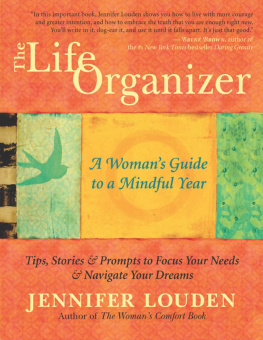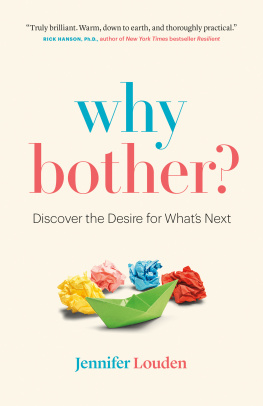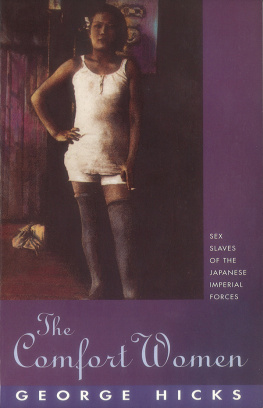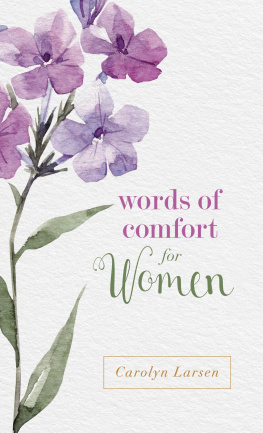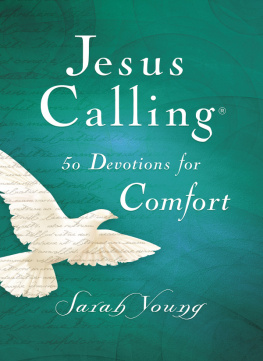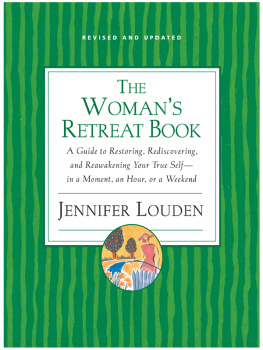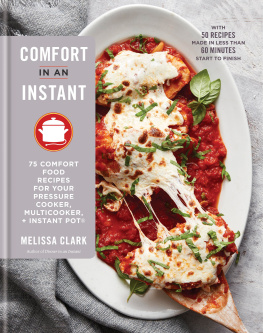For Betty Marie Louden, my mother
Until a few years ago, I felt like a fake. I had written five books about self-care and living life from the inside out, and yet I still handled deadlines like a drama queen, got burned out, ate unconsciously, wondered if I was living my life purpose, and otherwise failed to honor and listen to my inner wisdomnot just once in a while but sometimes daily. I forgot to ask myself mindful questions. I forgot to meditate. I avoided yoga, preferring to be a giant head, unattached to a body with sensations and desires. Yet the more I demanded perfection from myself, the more disconnected I became. What I have since learnedand must find ways to remind myself of every dayis that the part of me, the part of you, that is compelled to read, write, confabulate, teach, quest, coach, and learn is not the part that demands perfection in all things. The part of us that quests is the part of us that loves our imperfections; it is the part of us that knows our deepest strengths are our imperfections.
Or as the fourteenth-century Sufi master and poet Hafiz wrote, Now is the season to know / That everything you do / Is sacred.
Self-care is radical; it changes lives. When we practice self-care, we start refusing to stay in relationships, jobs, and attitudes that depend upon our hating ourselves. We begin to see possibilities where before there were only habits. I was in bed early because I had a terrible flu, Manuela said, recalling about her self-care discovery. There are these lines in your book about taking a close look at your body, become friends with your body. I was too weak to get up, so I looked at my hands. It was as if I had never seen these hands before. I had put on nail polish maybe a thousand times, but I had never taken a real look at my hands. I stared for what might have been many hoursthey were like the hands of a stranger. I was shocked to find I had treated not only my hands but my whole body this way. Dressing it up, making it look nice, keeping it in shape but only so I could make it attractive to others. I had never looked at my body as a part of me, as something that is mine. I was very rattled by this experience, but it began my year of awakening. I left a bad relationship, quit my job, and moved to the city in which I had always dreamed of living. It was the beginning of my adult life!
We read Manuelas story and we think, Yes! Yet Ive heard from so many women over the years that self-care is a good idea but only possible if you have a certain amount of time or money. That is a story we tell ourselves when we are still trapped in putting ourselves last.
I have an autistic daughter who will be twelve in February, wrote Lisa in an email. She is still in diapers, needs to be fed, and does not talk. My husband has hepatitis C, and my dad is not well. I take everybody to the doctor often. I dont have time for myself, yet I started a journal to learn who I am and what I want and need out of life. I lost your book, bought it again, and am currently working through it for a second time. My husband mentioned he likes me better when I am reading it and working in my journal! I have learned what inner spiritual happiness is for me, and I cherish it.
Diane was misdiagnosed at seventeen as a schizophrenic and spent the next twenty years in and out of hospitals. Then she found Gina, a psychotherapist, who was finally able to diagnose her correctly and help her get treatmenttreatment that included learning I had a right to be gentle and forgiving of myself. Gina told me my first move was to buy The Womans Comfort Book. By reading it and attempting to follow the exercises, I finally got to the point where I knew I deserved my humanity; it was okay to comfort myself. The first week out of the hospital, I pitched a tent in my bedroom and took long, warm candle-lit baths to reduce my anxiety. Healing is possible, and caring about yourself isnt an indulgence. Its a basic human right. Amen Diane and Lisa.
In the twelve years since The Womans Comfort Book was publishednot to mention the three years before in which I began my personal search to articulate what self-care ispeople across the world have become more candid, more voracious, more curious, and more furious about creating days, weeks, and lives that fit. In a small town in Indiana and a bank board room in Germany, a flat in Dublin, a farm in Australia, an apartment in Switzerland, in Japan, Brazil, and Sweden, we are stepping out of lives that bind, pinch, and creep and into lives that soar, flow, and float. While it is not necessarily becoming easier to make these moves, now there is a growing cultural conversation supporting us as we feel our way into a more gentle and whole way of living. We dont feel so alone when we turn away from endless striving and the endless more, more, more and turn toward listening to our inner guidance.
We read these womens stories, and we know we are not alone. We are each, in our own way, building a solid and dependable relationship with the one person we can count on no matter whatourselves. More and more womenand menare doing this: creating lives that fit, creating lives that matter. You are one of them.
Welcome to the revolution.
Jennifer Louden
November 2003
Bainbridge Island, Washington
Contents
Introduction
How to Read This Book
Its pouring, you had a miserable day at work, you got stuck in a traffic jam, and the only message on the answering machine is a wrong number.
or
Youre late picking up the kids from day care, youve got a splitting headache, the paper grocery bag splits as you walk to the front door, and you cant remember the last time you had any time to yourself.
or
Youre exhausted, but you wont take time off because everyone is counting on you. The phone rings, you agree to volunteer for another community fund-raiser, but as you reach to hang up, your back goes out and you end up in bed for a week.
or
All your friends are out of town, you havent had a decent date in months, your roommate ate the last piece of pizza, theres nothing on TV, and you dont feel like reading....
Now, what do you do?
A. Buy a gallon of double chocolate chip ice cream and eat the whole thing?
B. Call your mother, who will tell you to stop whining, which will only make you feel worse?
C. Sleep for a month?
D. Pick up The Womans Comfort Book: A Self-Nurturing Guide for Restoring Balance in Your Life ?
Why Nurture Ourselves?
Because self-nurturing is vital. Women take care of others every day. But how often dowe turn our wonderful nurturing ability toward ourselves?
Self-care is essential for our survival; it is essential as the basis for healthy, authenticrelationships; it is essential if we honestly want to nurture the people we care about.
Self-care is not selfish or self-indulgent. We cannot nurture others from a dry well. Weneed to take care of our own needs first, then we can give from our surplus, our abundance. When we nurture others from a place of fullness, we feel renewed instead oftaken advantage of. And they feel renewed too, instead of guilty. We have somethingprecious to give others when we have been comforting and caring for ourselves andbuilding up self-love.
Why We Dont Take Care of Ourselves
The synonyms in my thesaurus for nurturing are female, feminine, gentle, ladylike, tender, and womanly! As women, we are taught to meet everyone elses needs before wenurture ourselves. And as we are groomed into compliant beings, we come to believethat the people in our lives will anticipate and meet our needs as we do theirs. Whenthis does not happen, we begin to feel we have no right to our needs and desires. Addto this the fact that as women we have not traditionally been taught to care for ourself-esteem or to value ourselves as independent, worthwhile people. What we end upwith is women who are experts at nurturing othersuntil we drop of exhaustion or illness or escape into excessive drinking, shopping, or eating. We are goaded into devaluing self-nurturing. We either end up believing we dont deserve self-care or, if we do,that it must be the last thing on our mighty list of Things to Do.


